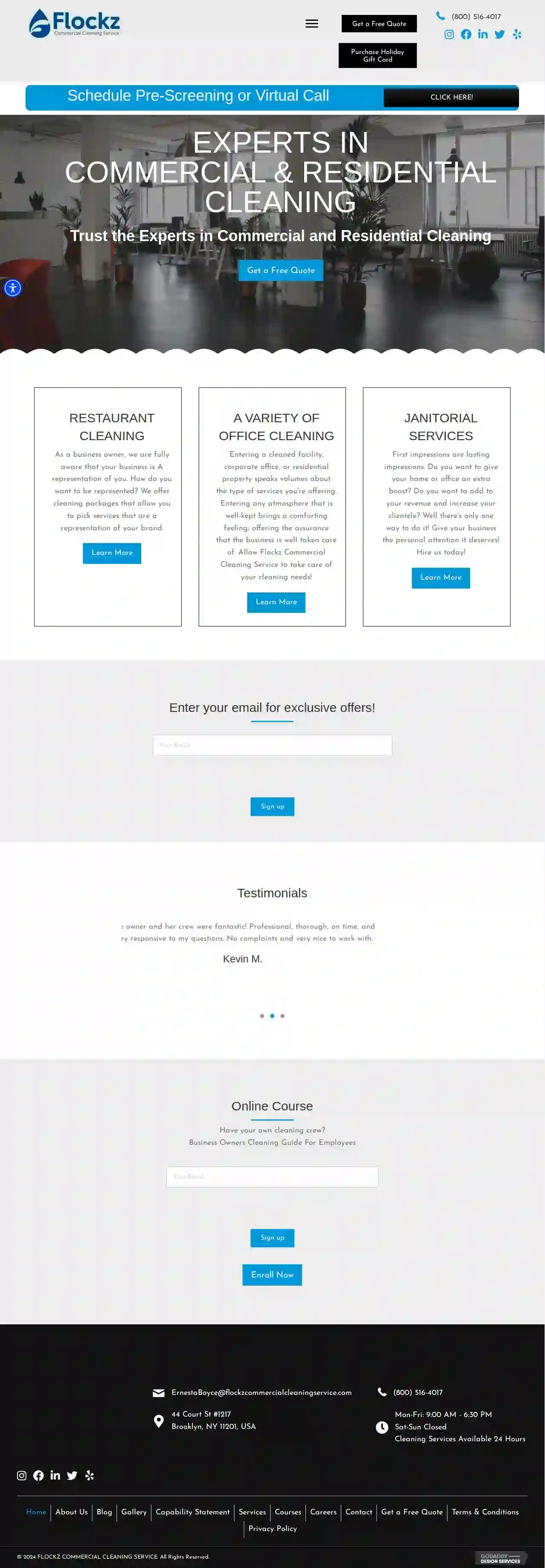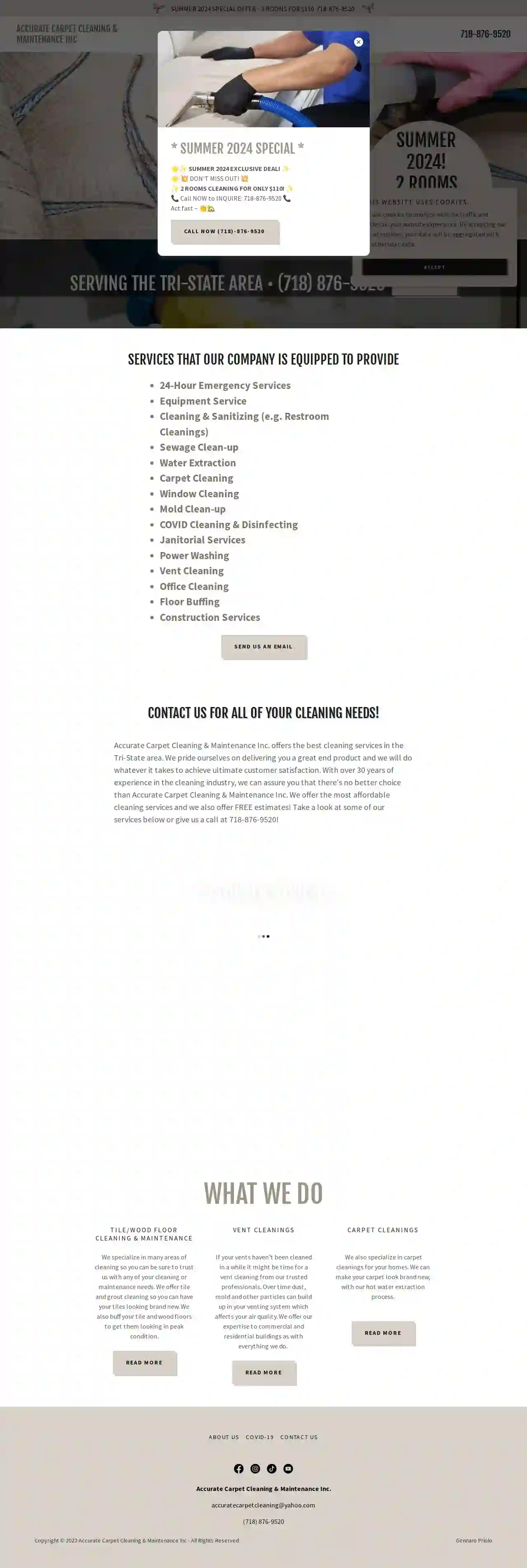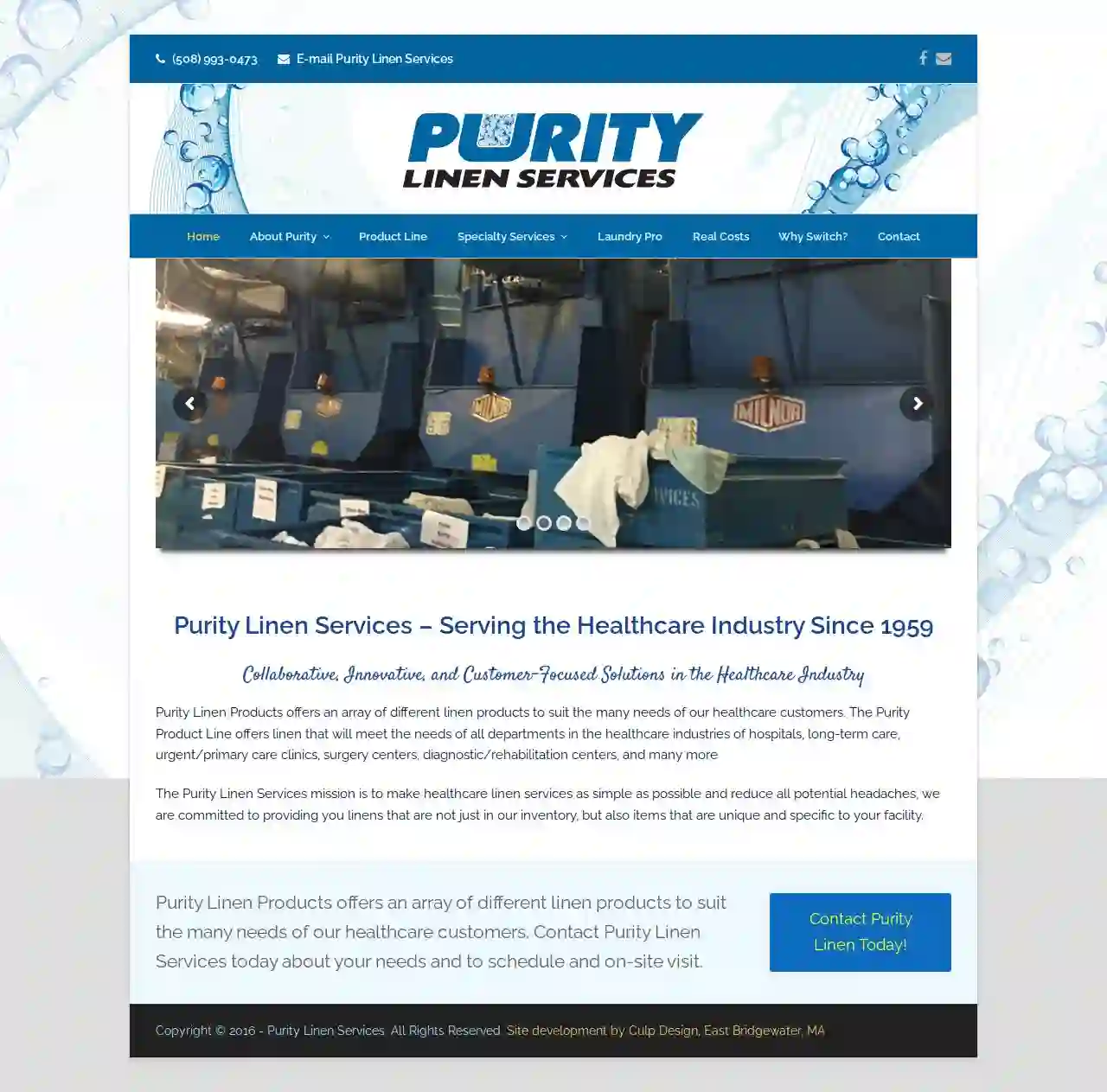Cleaning Services Johnson City
Top Apartment Cleaning in Johnson City
Receive up to 3 Professional Cleaners quotes for your project today! Compare profiles, reviews, accreditations, portfolio, etc... and choose the best deal.
Service Needed
City or Town

Accord Building Services
3.829 reviewsQueens, US- Services
- Why Us?
- Gallery
Get Quote
Planet Maids
4.597 reviewsQueens, US- Services
- Why Us?
- Gallery
Get Quote
JC Lima Cleaning Services
58 reviewsQueens, US- Services
- Why Us?
Get Quote- JP
JPDM Cleaners Inc - Residential and Commercial Cleaning Service, Affordable and Quality Cleaning Company
59 reviewsBronx, US- Services
- Why Us?
Get Quote 
Flockz Commercial Cleaning Service LLC
3.922 reviewsBrooklyn, US- Services
- Why Us?
Get Quote
Myah maids inc
588 reviewsHempstead, US- Services
- Why Us?
Get Quote- Su
Sunshine Cleaning Unlimited, LLC
4.233 reviewsQueens, US- Services
- Why Us?
Get Quote 
Move out Cleaning Service Staten Island
55 reviewsStaten Island, US- Services
- Why Us?
Get Quote
Accurate Carpet Cleaning & Maintenance Inc
4.838 reviewsStaten Island, US- Services
- Why Us?
Get Quote
Purity Linen Service
51 reviewsQueens, US- Services
- Why Us?
- Gallery
Get Quote
Over 60,241+ Janitorial Services on our platform
Our janitorial services operate in Johnson City & surroundings!
CleaningMatch has curated and vetted Top Janitorial Contractors in Johnson City. Find a trustworthy business today.
Frequently Asked Questions About Cleaning Services
Find answers to common questions about cleaning services and hiring cleaning companies in the USA.
- Regular dusting: Dust frequently using microfiber cloths or a duster. Pay attention to surfaces that attract dust, such as shelves, electronics, and furniture.
- Vacuuming: Vacuum carpets and rugs regularly using a vacuum cleaner with a HEPA filter to trap dust mites and allergens.
- Air Purifier: Consider using an air purifier to remove dust particles and allergens from the air.
- Reduce Clutter: Clutter provides more surfaces for dust to settle. Declutter regularly to minimize dust traps.
- Window Treatments: Wash or vacuum window treatments, such as curtains or blinds, regularly to remove dust buildup.
- Bedding: Wash bedding, including sheets, pillowcases, and blankets, weekly in hot water to remove dust mites.
- Doormats: Place doormats at entrances to trap dirt and dust from shoes before they enter your home.
- Check Fabric Care Label: Always check the upholstery care label for cleaning instructions specific to the fabric. Some fabrics may require professional cleaning.
- Vacuum: Vacuum the upholstery thoroughly to remove dust and loose debris. Use a brush attachment for crevices and seams.
- Spot Cleaning: For stains, blot with a clean cloth or sponge. Avoid rubbing, as it can spread the stain. Use a mild upholstery cleaner or a homemade solution of water and mild dish soap.
- Upholstery Cleaning Machine: If the fabric is suitable for wet cleaning, you can use an upholstery cleaning machine. Follow the machine's instructions carefully and test a small, hidden area first.
- Professional Upholstery Cleaning: For delicate fabrics, deep cleaning, or stubborn stains, consider hiring a professional upholstery cleaning service. They have specialized knowledge and equipment to clean upholstery safely and effectively.
- Online Directories: Use online directories like CleaningMatch to search for cleaning services in your area. Filter your search results by the specific cleaning type you need.
- Search Engines: Use search engines like Google to find cleaning services specializing in your desired cleaning type. For example, search for 'post-construction cleaning services near me' or 'eco-friendly cleaning services in [city name].'
- Ask for Referrals: Ask friends, family, neighbors, or colleagues if they know of any reputable cleaning services specializing in your desired cleaning type.
- Check Company Websites: Visit the websites of cleaning services in your area to see if they list the specific cleaning type you need among their services.
- Contact Companies Directly: Contact cleaning companies directly to inquire about their specialization in your desired cleaning type.
- Clean Pet Bedding: Wash pet bedding regularly in hot water to remove odors and bacteria.
- Vacuum Thoroughly: Vacuum carpets, rugs, and upholstery frequently using a vacuum cleaner with a pet hair attachment.
- Enzyme Cleaners: Use enzyme cleaners specifically designed for pet odors. These cleaners break down the odor-causing molecules.
- Baking Soda: Sprinkle baking soda on carpets and upholstery, let it sit for a few hours, then vacuum. Baking soda absorbs odors.
- Air Fresheners: Use air fresheners or diffusers to mask odors temporarily.
- Professional Cleaning: For persistent odors, consider hiring a professional cleaning service specializing in pet odor removal.
How do I prevent dust from accumulating in my home?
Dust is a common household nuisance, but several preventive measures can minimize its accumulation:
By implementing these preventive measures, you can significantly reduce dust accumulation and maintain a cleaner and healthier home.
By implementing these preventive measures, you can significantly reduce dust accumulation and maintain a cleaner and healthier home.
How do I clean upholstery without damaging the fabric?
Cleaning upholstery requires care to avoid damaging delicate fabrics. Follow these steps:
Always test any cleaning solution on a small, inconspicuous area first to avoid discoloration or damage.
Always test any cleaning solution on a small, inconspicuous area first to avoid discoloration or damage.
How do I find a cleaning service that specializes in [specific type of cleaning]?
If you need a cleaning service specializing in a particular type of cleaning, such as post-construction cleaning, window cleaning, or green cleaning, follow these steps:
By using these methods, you can find a qualified cleaning service that meets your specific cleaning needs.
By using these methods, you can find a qualified cleaning service that meets your specific cleaning needs.
How do I get rid of pet odors in my home?
Pet odors can linger in a home, creating an unpleasant environment. Here's how to eliminate them:
Regular cleaning, enzyme cleaners, and baking soda are effective methods for eliminating pet odors and maintaining a fresh-smelling home.
Regular cleaning, enzyme cleaners, and baking soda are effective methods for eliminating pet odors and maintaining a fresh-smelling home.
How do I prevent dust from accumulating in my home?
Dust is a common household nuisance, but several preventive measures can minimize its accumulation:
By implementing these preventive measures, you can significantly reduce dust accumulation and maintain a cleaner and healthier home.
- Regular dusting: Dust frequently using microfiber cloths or a duster. Pay attention to surfaces that attract dust, such as shelves, electronics, and furniture.
- Vacuuming: Vacuum carpets and rugs regularly using a vacuum cleaner with a HEPA filter to trap dust mites and allergens.
- Air Purifier: Consider using an air purifier to remove dust particles and allergens from the air.
- Reduce Clutter: Clutter provides more surfaces for dust to settle. Declutter regularly to minimize dust traps.
- Window Treatments: Wash or vacuum window treatments, such as curtains or blinds, regularly to remove dust buildup.
- Bedding: Wash bedding, including sheets, pillowcases, and blankets, weekly in hot water to remove dust mites.
- Doormats: Place doormats at entrances to trap dirt and dust from shoes before they enter your home.
By implementing these preventive measures, you can significantly reduce dust accumulation and maintain a cleaner and healthier home.
How do I clean upholstery without damaging the fabric?
Cleaning upholstery requires care to avoid damaging delicate fabrics. Follow these steps:
Always test any cleaning solution on a small, inconspicuous area first to avoid discoloration or damage.
- Check Fabric Care Label: Always check the upholstery care label for cleaning instructions specific to the fabric. Some fabrics may require professional cleaning.
- Vacuum: Vacuum the upholstery thoroughly to remove dust and loose debris. Use a brush attachment for crevices and seams.
- Spot Cleaning: For stains, blot with a clean cloth or sponge. Avoid rubbing, as it can spread the stain. Use a mild upholstery cleaner or a homemade solution of water and mild dish soap.
- Upholstery Cleaning Machine: If the fabric is suitable for wet cleaning, you can use an upholstery cleaning machine. Follow the machine's instructions carefully and test a small, hidden area first.
- Professional Upholstery Cleaning: For delicate fabrics, deep cleaning, or stubborn stains, consider hiring a professional upholstery cleaning service. They have specialized knowledge and equipment to clean upholstery safely and effectively.
Always test any cleaning solution on a small, inconspicuous area first to avoid discoloration or damage.
How do I find a cleaning service that specializes in [specific type of cleaning]?
If you need a cleaning service specializing in a particular type of cleaning, such as post-construction cleaning, window cleaning, or green cleaning, follow these steps:
By using these methods, you can find a qualified cleaning service that meets your specific cleaning needs.
- Online Directories: Use online directories like CleaningMatch to search for cleaning services in your area. Filter your search results by the specific cleaning type you need.
- Search Engines: Use search engines like Google to find cleaning services specializing in your desired cleaning type. For example, search for 'post-construction cleaning services near me' or 'eco-friendly cleaning services in [city name].'
- Ask for Referrals: Ask friends, family, neighbors, or colleagues if they know of any reputable cleaning services specializing in your desired cleaning type.
- Check Company Websites: Visit the websites of cleaning services in your area to see if they list the specific cleaning type you need among their services.
- Contact Companies Directly: Contact cleaning companies directly to inquire about their specialization in your desired cleaning type.
By using these methods, you can find a qualified cleaning service that meets your specific cleaning needs.
How do I get rid of pet odors in my home?
Pet odors can linger in a home, creating an unpleasant environment. Here's how to eliminate them:
Regular cleaning, enzyme cleaners, and baking soda are effective methods for eliminating pet odors and maintaining a fresh-smelling home.
- Clean Pet Bedding: Wash pet bedding regularly in hot water to remove odors and bacteria.
- Vacuum Thoroughly: Vacuum carpets, rugs, and upholstery frequently using a vacuum cleaner with a pet hair attachment.
- Enzyme Cleaners: Use enzyme cleaners specifically designed for pet odors. These cleaners break down the odor-causing molecules.
- Baking Soda: Sprinkle baking soda on carpets and upholstery, let it sit for a few hours, then vacuum. Baking soda absorbs odors.
- Air Fresheners: Use air fresheners or diffusers to mask odors temporarily.
- Professional Cleaning: For persistent odors, consider hiring a professional cleaning service specializing in pet odor removal.
Regular cleaning, enzyme cleaners, and baking soda are effective methods for eliminating pet odors and maintaining a fresh-smelling home.